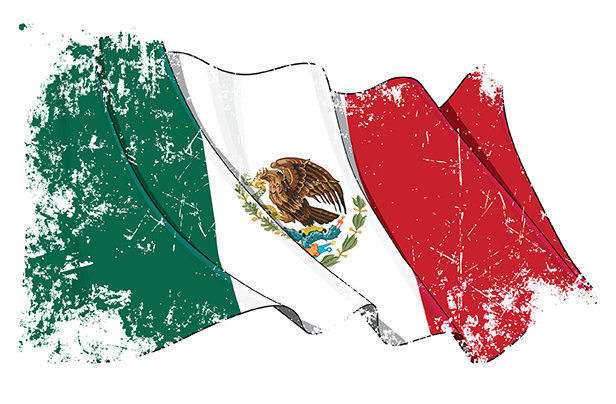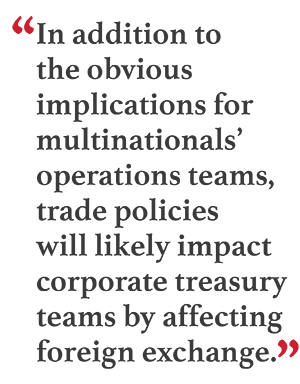 In his first days as president, Donald Trump made good on one facet of his promise to overhaul American trade policy by withdrawing from the Trans-Pacific Partnership (TPP), a key trade deal negotiated by the Obama administration. In doing so, he made it clear that this would be just the first in a series of aggressive moves meant to bolster U.S. competitiveness on the world stage.
In his first days as president, Donald Trump made good on one facet of his promise to overhaul American trade policy by withdrawing from the Trans-Pacific Partnership (TPP), a key trade deal negotiated by the Obama administration. In doing so, he made it clear that this would be just the first in a series of aggressive moves meant to bolster U.S. competitiveness on the world stage.
The next trade pact in Trump's sights is NAFTA. Although it is the centerpiece of commerce among the U.S., Mexico, and Canada, renegotiation of NAFTA was a key theme of Trump's candidacy and a central point of discussion when the president met with Canadian Prime Minister Justin Trudeau last week.
While highly unlikely to be scrapped entirely, NAFTA will probably have its terms redrawn to align more closely with U.S. economic interests. For example, observers expect Trump to push for U.S. corporate tax rates to be cut to spur investment at home. At the same time, reports suggest that U.S. manufacturers who ship to Mexico will be hit with an average tariff on industrial goods of 7.7 percent. In every case, as publicized, a renegotiated NAFTA is part of the new administration's plan to bring employment opportunities back to the country. This could also make way for other trade agreements that lean toward putting the United States in a more advantageous position.
Recommended For You
 How this will play out remains to be seen, but in addition to the obvious implications for multinationals' operations teams, the administration's trade policies will likely impact corporate treasury teams by affecting foreign exchange (FX). In fact, the rhetoric in U.S. politics over the past few months has already contributed to currency volatility between the U.S. and Mexico. Dollar-peso exchange rates have been pivoting on every word (and tweet) from the new American leader. Early indications suggested that a Trump presidency would be catastrophic for the peso, with the dollar soaring to record highs against Mexico's currency. Since then, though, the peso has rallied on the belief that Trump's brand of protectionism might actually favor a weaker, more affordable dollar.
How this will play out remains to be seen, but in addition to the obvious implications for multinationals' operations teams, the administration's trade policies will likely impact corporate treasury teams by affecting foreign exchange (FX). In fact, the rhetoric in U.S. politics over the past few months has already contributed to currency volatility between the U.S. and Mexico. Dollar-peso exchange rates have been pivoting on every word (and tweet) from the new American leader. Early indications suggested that a Trump presidency would be catastrophic for the peso, with the dollar soaring to record highs against Mexico's currency. Since then, though, the peso has rallied on the belief that Trump's brand of protectionism might actually favor a weaker, more affordable dollar.
More U.S.-based companies are doing business in Mexico than ever before, and this volatility in peso-dollar spreads will continue to vex the treasurers and others overseeing these companies' cash flows to and from the country. This is especially true for small and midsize operations that don't have access to large, sophisticated FX management teams.
Consider the case of a Texas-based manufacturer of automotive parts that is considering, for logistical purposes, whether to shift production to Mexico. Under the status quo, the company may be tempted to produce its goods in Mexico, as inputs and labor are cheaper there and finished products may be exported to the U.S. tariff-free.
However, if a revised NAFTA were to incentivize domestic production by imposing some form of border tax, then the equation would change substantially. It might be clear to executives and line-of-business management how a tariff would affect the cost-benefit analysis. But senior management might need treasury's assistance to see the probable secondary effects of a border tax: It would likely lead to a stronger, more autonomous peso, which would make the various input costs (land, labor, materials) more expensive south of the border. When deciding where to site its next facility, the manufacturer would need to take into account currency conversions.
The real-world circumstances that businesses face are obviously much more complex than this scenario. But it helps illustrate the point that treasurers of multinational companies, whether large or small, need to be part of the conversation on operations decisions, particularly in a political situation as unpredictable and rapidly changing as our current environment.
Corporate finance professionals can turn to technologies such as automated exchange rates and advanced analytics tools to ensure that they are prepared to advise senior management on how currencies are shifting, and how those shifts will affect the business. Whichever direction the peso moves versus the dollar, the most effective finance professionals will be those who have the information they need to respond in real time.
 Natasha Lala is the managing director of OANDA's Solutions for Business group, which provides a full suite of foreign exchange (FX) services, trusted by the Big Four, tax authorities, and thousands of clients worldwide. Lala has been at OANDA since 2003 in a variety of executive roles, helping clients navigate FX markets. Previously, Natasha led large-scale client-facing initiatives in the CRM, telecom, and financial industries.
Natasha Lala is the managing director of OANDA's Solutions for Business group, which provides a full suite of foreign exchange (FX) services, trusted by the Big Four, tax authorities, and thousands of clients worldwide. Lala has been at OANDA since 2003 in a variety of executive roles, helping clients navigate FX markets. Previously, Natasha led large-scale client-facing initiatives in the CRM, telecom, and financial industries.
© 2025 ALM Global, LLC, All Rights Reserved. Request academic re-use from www.copyright.com. All other uses, submit a request to [email protected]. For more information visit Asset & Logo Licensing.




